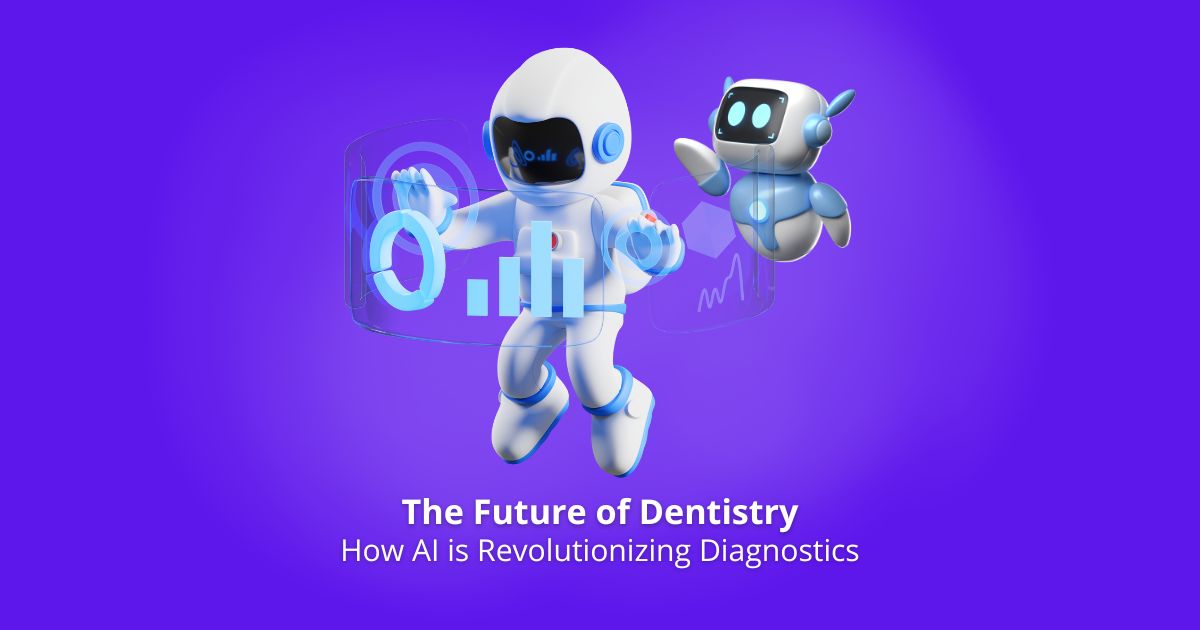Artificial intelligence (AI) is making a remarkable impact in the field of dentistry, especially in diagnostics. By improving diagnostic accuracy, streamlining workflows, and enhancing patient communication, AI is setting a new standard for dental care.

With tools like Diagnocat, dental practices are harnessing the power of AI to provide faster, more reliable diagnostics, leading to better outcomes for both patients and practitioners. Here’s a closer look at how AI is transforming the landscape of dental diagnostics and what it means for the future of dentistry.
AI-Powered Imaging for Greater Diagnostic Precision
Traditional X-rays and CBCT scans provide valuable information, but interpreting these images can be challenging, especially in complex cases. AI-powered imaging systems are designed to analyze these images with remarkable precision, identifying potential issues that may go unnoticed by the human eye. AI can detect early signs of decay, bone loss, root fractures, and other conditions with high accuracy, enabling dentists to provide timely and targeted interventions.
The precision of AI-driven diagnostics reduces the risk of misdiagnosis and helps dentists make more informed treatment decisions. By providing a reliable second opinion, AI enhances diagnostic accuracy, allowing practitioners to deliver the best possible care.
Faster Diagnostics for Enhanced Patient Experience
AI not only improves diagnostic accuracy but also accelerates the diagnostic process itself. AI algorithms can process imaging data within seconds, reducing the time patients spend waiting for results. This efficiency allows dentists to spend more time on patient consultations and treatment planning, enhancing the overall patient experience.
For patients, faster diagnostics mean quicker appointments and a more seamless visit to the dentist. The streamlined experience fosters patient satisfaction and reduces anxiety, as patients feel reassured knowing that their dental issues are being addressed promptly and efficiently.
Predictive Analytics for Proactive Dental Care
AI’s ability to analyze patient data over time opens the door to predictive analytics in dentistry. By examining a patient’s history and dental patterns, AI can predict potential issues, such as an increased likelihood of cavities, gum disease, or bone loss. This proactive approach allows dentists to recommend preventive treatments tailored to each patient’s unique needs, reducing the risk of developing serious dental conditions.
Predictive analytics help shift dentistry from a reactive to a proactive model, where the focus is on preventing problems before they require extensive treatment. This approach not only improves patient outcomes but also reduces long-term costs for patients, as preventive care is often less expensive and less invasive than corrective procedures.
Personalized Treatment Plans
AI in diagnostics enables a higher level of personalization in dental care. With access to a wealth of patient data, AI can recommend treatment plans tailored specifically to the patient’s individual needs, habits, and risk factors. For instance, an AI system might suggest more frequent cleanings for a patient at high risk of gum disease or fluoride treatments for someone prone to cavities.
Personalized treatment plans improve patient engagement and compliance, as patients are more likely to follow recommendations when they feel the care is customized for them. This tailored approach contributes to better patient satisfaction and long-term oral health.
AI-Enhanced Patient Communication and Education
Dental conditions and treatment plans can be complex and difficult for patients to understand. AI-powered tools that provide clear, detailed visualizations of conditions and treatment options make it easier for dentists to communicate with patients. With AI, practitioners can show patients images of their dental issues and explain exactly why certain treatments are necessary.
Better patient education leads to more informed decision-making and greater trust in the dentist’s recommendations. When patients understand their condition and the proposed solution, they are more likely to follow through with treatment plans, which improves outcomes and strengthens the patient-practitioner relationship.
Streamlined Workflows for Dental Practices
Beyond diagnostics, AI is helping dental practices streamline their workflows by automating time-consuming tasks. From appointment scheduling and billing to data management, AI can handle many administrative functions, allowing staff to focus on patient care. This enhanced efficiency not only reduces operational costs but also enables practices to see more patients without compromising the quality of care.
AI’s role in managing workflow improves the overall patient experience as well. By automating routine tasks, AI helps reduce wait times, ensures that appointments run smoothly, and minimizes the risk of errors in patient records.
The Future of AI in Dentistry
As AI technology continues to evolve, its role in dental diagnostics will only grow. Future advancements may include even more accurate image analysis, enhanced predictive capabilities, and improved integration with other digital health tools. The potential for AI to analyze genetic data or integrate with wearable devices could allow for a more comprehensive view of a patient’s oral health, further personalizing and refining preventive care.
AI’s integration into dental care is part of a broader trend toward digital transformation in healthcare. As AI tools become more advanced and widely adopted, they will set new standards for diagnostic accuracy, patient care, and practice efficiency in dentistry.
Conclusion
AI is revolutionizing dental diagnostics by providing faster, more accurate, and more personalized care. From enhancing imaging precision to enabling proactive care and improving patient communication, AI offers countless benefits to both practitioners and patients.
With AI-powered solutions like Diagnocat, dental practices can harness these advancements to stay ahead in an increasingly competitive field and provide the highest quality of care. As we look to the future, the role of AI in dentistry will continue to expand, promising a new era of precision and patient-centered care.